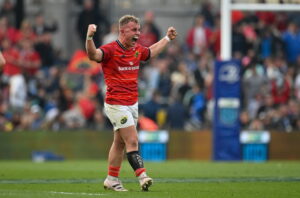I played at #7 for most of my days slogging in rugby so it’s safe to say that referees and I don’t really get along all that well. There’s respect for them, sure, in so far as if they send me off I’ll leave the field, or award a dodgy penalty against me I’ll walk away muttering it but inside, I’d rage.
For me, the worst was the refs with the smug head on them trying to play the comedian nanny while scolding two lads who are half-wrecked from the game. I once copped a dissent penalty for telling sir if he could just hurry up and penalise me and the lad from the opposition for fighting rather than standing there chastising us in the horizontal icebox rain.
Maybe I’m just the wrong sort. Actually, jeez, maybe that’s why I was never a captain either. In the middle of the contest, you forget that it’s an invented game between 30 shaved homo sapiens chasing a weird ball around a field on a giant rock orbiting the sun in an endless void. It becomes that life and death stuff that Bill Shankly spoke about.
I suspect, deep down, a lot of players feel the same way in the heat of the moment – they just don’t crowd around Sir shouting the odds. After all, as The Best Referee In The World™ says on t-shirts and mugs, “This Is Not Soccer”. At least on the outside, it isn’t. Inside, we’re all raging like Roy Keane. It’s respect on the outside, x-rated swear-a-palooza on the inside. And look, it’s a tough gig – one of the toughest in sports – but few games are as affected by a referee’s decision making as much as rugby union.
An old coach of mine used to chide us pre-game that all it takes is three penalties in a row to lose a game. If just one of those is BS it can turn a game on its head. In the environment of a match the referee is God and if God makes mistakes, then the effects can be wide-ranging. Like wasps, for example. Who’s idea was that?
If there is a God, then that’s one thing I’d like a bit of clarity on from the deity assessor post-afterlife. Basically, we can have the discipline of Shaolin monks but if sir is calling penalties that just aren’t there – like the game-defining one with Sam Arnold and Robbie Henshaw on Saturday – what good is it?
The performance from Mr Whitehouse Jnr and his crew on Saturday night just wasn’t up to the occasion with all due respect to the gentlemen in question. It’s very hard to beat Leinster at the best of times in the Aviva but it’s almost impossible to do so when they benefit from some big decisions and some non-decisions.

A refereeing performance is usually judged on how accurately the big moments are decided and a lot of those were contentious here, to say the least. Everything from Earls yellow card, penalty try and 14 points conceded during the bin period to Arnold’s supposed “deliberate knock-on” that prevented an Earls intercept try to Munster’s multiple scrum penalties under the Leinster posts that didn’t see a yellow card or penalty try awarded with the same black and white clarity that Leinster enjoyed earlier was quite controversial in the grand scheme of this contest.
Leinster would have won regardless I suspect because they really are that good. But I’d like to see how that game looks with Keith Earls try and Leinster defending with 14 men for the last 10 minutes rather than Alby Mathewson getting injured scoring a try off a scrum that would have been a penalty try but for an errant “use it”. I’d also like to magically pull random €50 notes out of my wallet whenever I wanted but that’s not going to happen either.
So where do Munster stand? We know they can tangle with close to Leinster’s first team. This was a strong Leinster side. After all, you don’t become double PRO14 and Heineken Cup champions without having massive amounts of quality all through your squad and that was certainly the case here. Forget the guff about a “weakened” team – there were 12 internationals in Leinster’s starting XV and 7 on the bench, with 6 British & Irish Lions in their matchday squad overall.
Even with that, Leinster chose to rest Sexton, Furlong, Fardy, Ringrose and Larmour from their matchday squad which shows the benefits of having a deep squad with a settled style of play over the last two to three years.
Everyone who came in was able to duplicate the role of the man they replaced – to a certain extent – and it didn’t affect the overall flow of their game. Yes, they were minus Furlong and Sexton, who would walk into any side in the world but Munster will still feel they did enough on the day to come away with more than what they did in the end.
Exeter will be a different beast but if Munster take last Saturday’s lessons into Sandy Park, they’ll be close. How close depends on a lot of things. Sir included.









